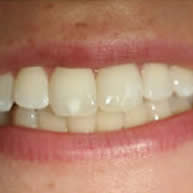Senior adults have unique oral health needs that come with age. Here are the answers to some frequently asked questions by seniors.
Do seniors need to worry about cavities?
Cavities can actually occur more often in seniors than younger people. Less exposure to fluoride over your lifetime and deterioration of older fillings can contribute to decay. Receding gums can expose tooth roots, promoting cavities in that area. Also, dry mouth is a common problem in seniors and can cause tooth decay.
Why are my teeth more sensitive as I get older?
Receding gums are often a culprit of tooth sensitivity. A soft tissue graft may be required to solve this problem. Switching to toothpaste designed for sensitive teeth can help, as well as using a fluoride mouth rinse.
What can I do if arthritis makes it hard to care for my teeth?
There are several things to help seniors who have difficulty completing oral health tasks. Wrap your toothbrush handle with tape to make it thicker, or tape popsicle sticks or small wooden rulers to the handle to make it longer. Try switching to an electric toothbrush, and check out the flossing aids available at your drug store.
What can I do about loose teeth?
See a periodontist, a type of dentist who specializes in the soft tissues of the mouth and supporting structures. This dentist can examine your mouth, and provide suggestions for treatments or changes in your hygiene or medical care that might help.
Can my mediations affect my oral health?
Medications can definitely impact your teeth and gums. Provide your dentist with a list of medications you take so that any issues can be best addressed. For example, some drugs are known to cause dry mouth, which can increase your risks of decay. It’s possible that another medication without that side effect can be prescribed instead.
Are seniors at more risk for oral cancer?
Oral cancer risks increase with age, and long-term smoking also puts you at higher risk.
Any lesions on your tongue or in your mouth should be closely monitored by your dentist.
At what age can I stop seeing the dentist?
Even if you have little or no dental problems, you should continue with regular dental checkups for your entire life.






